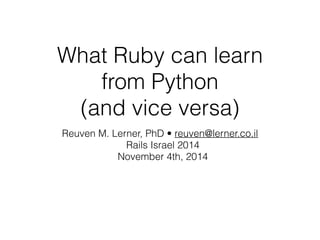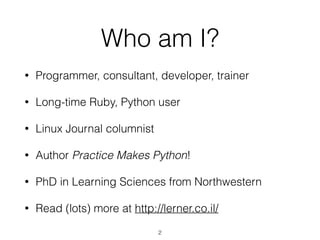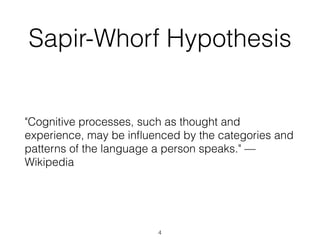What can Ruby learn from Python (and vice versa)?
- 1. What Ruby can learn from Python (and vice versa) Reuven M. Lerner, PhD • [email protected] Rails Israel 2014 November 4th, 2014
- 2. Who am I? • Programmer, consultant, developer, trainer • Long-time Ruby, Python user • Linux Journal columnist • Author, Practice Makes Python! • PhD in Learning Sciences from Northwestern • Read (lots) more at http://lerner.co.il/ 2
- 3. Python, Ruby, and me
- 4. Sapir-Whorf Hypothesis "Cognitive processes, such as thought and experience, may be influenced by the categories and patterns of the language a person speaks." — Wikipedia 4
- 5. Or: You are what you speak! 5
- 6. Learning a language helps you not only communicate, but also to think in new ways 6
- 7. 7
- 8. 你有叉⼦子吗? Nǐ yǒu chāzi ma? Do you have a fork? 8
- 9. Possible answers • "Yes" • "No" • "What's a fork?" • "Your accent is so bad, I have no idea what you're saying" 9
- 10. The actual answer? • None of the above! • Chinese doesn't have words for "yes" and "no." 10
- 11. 你有叉⼦子吗? Nǐ yǒu chāzi ma? Do you have a fork? Answer: 有 (yǒu) "Have" 11
- 12. Can you think of another language that works this way? 12
- 13. בראשית כ״ט, ו׳ ויאמר, ״השלום לו?״ ויאמרו ״שלום.״ Genesis 29:6 And he said, "Is he well?" And they said, "Well!" (i.e., "Yes!") 13
- 14. And also… CREATE TABLE Foo (id SERIAL, stuff TEXT); CREATE TABLE INSERT INTO Foo (stuff) VALUES ('abc'); INSERT 0 1 14
- 15. Comparing languages • Appreciate each one more • Reflect on the relative trade-offs 15
- 16. Ruby and Python both… • … dynamically and strongly typed • … are JIT byte-compiled • … are cross-platform • … are widely used for a variety of tasks • … popular among Web developers • … have multiple implementations • … have an object system based (in part) on Smalltalk 16
- 17. And yet • Python and Ruby feel very different • What can we learn from these differences? • What can we learn from the Python world? (And what can they learn from us?) 17
- 18. General attitude • Ruby wants to give you freedom, to allow you to be creative and flexible, as in a natural language • TMTOWTDI, POLS • Python wants to restrict you, for your own good • "There should be one — and preferably only one — obvious way to do it." 18
- 19. The result? • Python is • easier to learn • easier to debug and maintain • Ruby • offers you richer options • greater expressiveness 19
- 20. Development process • Python Enhancement Proposals (PEPs) • Ruby could use such a system • Heck, Rails could use such a system 20
- 21. Backward compatibility • Historically, Python upgrades were conservative • But not 2.x -> 3.x • Ruby was less conservative, breaking things (especially going from 1.8 to 1.9/2.0) • Maybe Python emphasis on compatibility and inclusiveness hurt the 3.x upgrade 21
- 22. What is truth? • Ruby: Everything is true, except for false and nil • Python: Everything is true, except for None, False, 0, and empty data (e.g., '' or []) • So: 0 is false in Python, but true in Ruby! • But we all like #blank? and #present? in Rails… 22
- 23. Everything is an object… • In both Ruby and Python, everything is an object! • But in Python, some objects are more equal than others… • So you can't do this in Python: 5.times { puts "Hello" } 23
- 24. Blocks • Ruby people love blocks! • Python doesn't have them. • They create functions, and pass those • Or they use lambdas (or not) 24
- 25. Namespaces • Python has a single namespace for functions and variables. So x can be an int, a str, or a function • Ruby has two separate namespaces — one for methods, and one for data • Ruby's approach can lead to surprises! x = 10 # set a local variable self.x = 10 # invoke an attr_ method 25
- 26. Reserved words • Python barely has any: True, False = False, True • Ruby lets us open built-in classes, but not this! 26
- 27. Modern Python • Fine, modern Python outlaws this. But it allows: >>> str = [1,2,3] >>> type(str) <class 'list'> 27
- 28. Scoping • Python has clear rules for scoping: LEGB (local, enclosing function, global builtin) • Ruby's scoping rules feel natural, but the rules aren't easy to learn or remember. 28
- 29. Indentation • Newcomers to Python hate the indentation rules • But I actually like them! • Easy to read • No annoying "end - end - end - end" all over • Easy to see where code begins and ends • That said, Ruby's syntax would never work with Python's indentation rules 29
- 30. Parentheses • Needed in Python to invoke methods and create classes • Makes it easier to pass functions as parameters • Not needed in Ruby to invoke methods • Makes DSLs cleaner, easier to write and read • You cannot pass a method just by name; use method(:foo) • DSLs in non-Ruby languages look far uglier, and look like the original language, not a new one 30
- 31. Explicit return • In Ruby, the value of the final line evaluated is the value of the method. We often don't say "return" • In Python, if you don't say "return", then your method returns None • I don't see an advantage to Python's behavior 31
- 32. Attributes vs. methods • In Ruby, object state is private, and access is all done through methods. • Want to access data? Write a getter or setter • Or use attr_*, and Ruby will write them for you • In Python, object state is public • Getters and setters are discouraged • Want the logic of a getter or setter? Use a "property," which invokes a method when you access an attribute 32
- 33. In other words • Ruby tries to make data look like methods • Method calls are the fundamental form of inter-object communication • Python tries to make methods look like data • Attributes are open, and thus there is less need for methods to access data • Besides, attributes exist in a single namespace 33
- 34. Object model • In Ruby, the object model emphasizes methods and inheritance of those methods • What are your methods, and what are your superclass's methods? • In Python, the object model emphasizes attributes and "inheritance" of those attributes • What attributes are defined on an object, and what are define on its class? 34
- 35. What is hard to learn? • Each object model leads to something that is hard for people to understand • In Ruby, you have to understand singleton classes (aka eigenclasses) • In Python, you have to understand how attributes work, including attribute scoping rules 35
- 36. Multiple inheritance vs. include/extend • Python: Multiple inheritance is OK, if you do it right • Ruby: You won't get it right. Use modules!. • The inheritance tree is very easy to figure out • Modules allow for mixins, the only good reason for multiple inheritance 36
- 37. for loops vs. Enumerable • In Ruby, we want to iterate over everything • Implement #each in your class • include Enumerable • Now you get map, select, and many other methods 37
- 38. for loops vs. Enumerable • In Python, we also want to iterate over everything • We do that with "for" loops and other global constructs (e.g., comprehensions) • Our object plug into these constructs by implementing the iteration protocol 38
- 39. list.sort's return type • Python's, list.sort returns None, not the list • In Ruby, we almost always return an object from a method, so that we can chain the method calls. 39
- 40. Comprehensions • Python has comprehensions: [str(x) for x in range(5)] [x*x for x in range(5)] [line.split(":")[0] for line in open('/etc/passwd')] 40
- 41. Sets and dicts • Set comprehensions {word.strip() for word in open('/usr/share/dict/words')} • Dictionary comprehensions {line.split(":")[0] : line.split(":")[2] for line in open('/etc/passwd') if line.startswith("#")} 41
- 43. Ruby is more consistent • In Ruby, we use the block syntax everywhere (0..4).map {|n| n.to_s} (0..4).map {|n| n * n} File.open('/etc/passwd').readlines. map {|line| line.split(":")[0]} 43
- 44. The Ruby version Hash[File.open('/etc/passwd'). readlines. select {|line| line[0] != '#'}. map {|line| line.split(":")}. map {|row| [row[0], row[2]]} ] • Longer, but more consistent 44
- 45. Easy metaprogramming • Metaprogramming is fun and easy in Ruby • Python permits it, but discourages such things • Most of the time, use decorators 45
- 46. 46 Oscar Felix (Python) (Ruby)
- 47. 你们有问题吗? יש לכם שאלות? (Do you have any questions?) [email protected] @reuvenmlerner http://lerner.co.il/ 47






















![What is truth?
• Ruby: Everything is true, except for false and nil
• Python: Everything is true, except for None, False,
0, and empty data (e.g., '' or [])
• So: 0 is false in Python, but true in Ruby!
• But we all like #blank? and #present? in Rails…
22](https://image.slidesharecdn.com/rubypythonlearnfromoneanother-141104130816-conversion-gate02/85/What-can-Ruby-learn-from-Python-and-vice-versa-22-320.jpg)




![Modern Python
• Fine, modern Python outlaws this. But it allows:
>>> str = [1,2,3]
>>> type(str)
<class 'list'>
27](https://image.slidesharecdn.com/rubypythonlearnfromoneanother-141104130816-conversion-gate02/85/What-can-Ruby-learn-from-Python-and-vice-versa-27-320.jpg)












![Comprehensions
• Python has comprehensions:
[str(x) for x in range(5)]
[x*x for x in range(5)]
[line.split(":")[0]
for line in open('/etc/passwd')]
40](https://image.slidesharecdn.com/rubypythonlearnfromoneanother-141104130816-conversion-gate02/85/What-can-Ruby-learn-from-Python-and-vice-versa-40-320.jpg)
![Sets and dicts
• Set comprehensions
{word.strip()
for word in open('/usr/share/dict/words')}
• Dictionary comprehensions
{line.split(":")[0] : line.split(":")[2]
for line in open('/etc/passwd')
if line.startswith("#")}
41](https://image.slidesharecdn.com/rubypythonlearnfromoneanother-141104130816-conversion-gate02/85/What-can-Ruby-learn-from-Python-and-vice-versa-41-320.jpg)

![Ruby is more consistent
• In Ruby, we use the block syntax everywhere
(0..4).map {|n| n.to_s}
(0..4).map {|n| n * n}
File.open('/etc/passwd').readlines.
map {|line| line.split(":")[0]}
43](https://image.slidesharecdn.com/rubypythonlearnfromoneanother-141104130816-conversion-gate02/85/What-can-Ruby-learn-from-Python-and-vice-versa-43-320.jpg)
![The Ruby version
Hash[File.open('/etc/passwd').
readlines.
select {|line| line[0] != '#'}.
map {|line| line.split(":")}.
map {|row| [row[0], row[2]]} ]
• Longer, but more consistent
44](https://image.slidesharecdn.com/rubypythonlearnfromoneanother-141104130816-conversion-gate02/85/What-can-Ruby-learn-from-Python-and-vice-versa-44-320.jpg)


